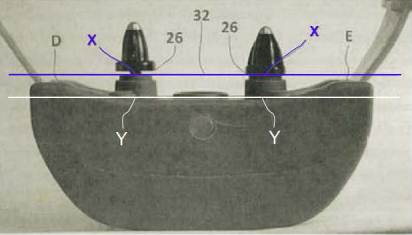In Radio Systems Corp. v. Lalor, No. 12-1233 (Fed. Cir.
Mar. 6, 2013), the Federal Circuit
affirmed-in-part the district court's grant of SJ for
noninfringement of U.S. Patent No. 6,830,014
("the '014 patent"), and reversed-in-part
and remanded the district court's grant of SJ for
noninfringement of U.S. Patent No. 7,267,082 ("the
'082 patent"), because the district court abused its
discretion in applying equitable estoppel when there was no
evidence of detrimental reliance on misleading conduct or
silence.
Tom Lalor and Bumper Boy, Inc. (collectively "Bumper Boy") own the '014 and '082 patents, of which the '082 patent is a CIP of the '014 patent. Both patents disclose an animal collar having an "inside surface" and one or more "high point surfaces" that extend above a base of electrodes. Radio Systems Corp. and Innotek, Inc. (collectively "Radio Systems") make and sell animal collars having inward-protruding electrodes. In 2005, Bumper Boy sent Innotek a demand letter alleging infringement of the '014 patent. Innotek responded that its own collar was prior art that invalidated the claims of the '014 patent. Bumper Boy took no subsequent action for over four years, and Innotek continued making and selling collars, with Innotek ultimately being acquired by Radio Systems. In 2009, Bumper Boy sent Radio Systems a demand letter stating that Radio Systems' collars, including the Innotek collar from the 2005 demand letter, infringed both the '014 and '082 patents. Radio Systems brought suit, seeking a DJ of noninfringement and invalidity. Bumper Boy counterclaimed for infringement of the '014 and '082 patents. The district court granted SJ of noninfringement of three Radio Systems collars and concluded that equitable estoppel barred Bumper Boy from accusing infringement for the Innotek collar. Bumper Boy appealed the district court's claim construction and application of equitable estoppel.
"Our precedent confirms that equitable estoppel applies to successors-in-interest where privity has been established." Slip op. at 11.
On appeal, the Federal Circuit first reviewed the construction
of two claim terms: "electrode base" and
"inside surface." Construing "inside
surface" as "the portion of the collar housing facing
inwards towards the animal" and "electrode base" as
"the portion of the electrode where it intersects the inside
surface of the collar housing," slip op. at 4 (citation
omitted), the district court determined that the electrode bases of
Radio Systems' collars were represented by points X in the
reproduced image, id. at 6. Thus, the district court
concluded that Radio Systems' collars did not infringe because
they did not have a high point surface that extended the inner
surface of the collar past the horizontal line created by points X.
 Bumper Boy argued that the "electrode
base" should be at points Y rather than at points X. The
Court found that the district court correctly concluded that the
electrode bases of Radio Systems' collars were at points X, and
that Radio Systems' collars did not have the "high point
surfaces" of Bumper Boy's claims that require the inside
surface of the collar housing to be extended past the line created
by the electrode bases. Accordingly, the Court affirmed the
district court's grant of SJ of noninfringement for Radio
Systems as to the three Radio Systems collars.
Bumper Boy argued that the "electrode
base" should be at points Y rather than at points X. The
Court found that the district court correctly concluded that the
electrode bases of Radio Systems' collars were at points X, and
that Radio Systems' collars did not have the "high point
surfaces" of Bumper Boy's claims that require the inside
surface of the collar housing to be extended past the line created
by the electrode bases. Accordingly, the Court affirmed the
district court's grant of SJ of noninfringement for Radio
Systems as to the three Radio Systems collars.
The Federal Circuit next addressed the district court's application of equitable estoppel in granting SJ of noninfringement for the Innotek collar. The district court found that Bumper Boy misled Innotek though its 2005 demand letter and subsequent silence for over four years, and that Innotek relied on this silence by significantly expanding its product line and by being acquired by Radio Systems, thus estopping Bumper Boy from alleging infringement. Bumper Boy argued that equitable estoppel could only apply, if at all, to Innotek, because Radio Systems was a different legal entity and must independently show detrimental reliance. Bumper Boy further argued that Radio Systems neither knew about Bumper Boy's 2005 demand letter to Innotek, nor relied on it. Alternatively, Bumper Boy argued that even if equitable estoppel applied to the '014 patent, it should not apply to the '082 patent, which issued in 2007 and was not mentioned in the 2005 demand letter. Radio Systems argued that, as Innotek's successor-in-interest, equitable estoppel should apply, and that the district court properly treated the '014 and '082 patents as one in applying equitable estoppel.
The Federal Circuit held that the district court did not abuse its discretion in applying equitable estoppel to the '014 patent. With respect to Innotek, the Court found that the elements of equitable estoppel were present. The Court also held that the district court did not abuse its discretion in concluding that equitable estoppel barred Bumper Boy's infringement claims against Radio Systems, noting that "[o]ur precedent confirms that equitable estoppel applies to successors-in-interest where privity has been established." Id. at 11. However, the Court concluded that the district court abused its discretion in applying equitable estoppel to the '082 patent. "Regardless of whether the '082 patent claims are supported by the subject matter in the '014 patent—and therefore entitled to claim priority to its filing date—the patents contain claims of different scope. Quite simply, the '082 patent claims could not have been asserted against Innotek or Radio Systems until those claims issued." Id. at 11-12. The Court found no misleading conduct or silence by Bumper Boy, because there was no notice of infringement of the '082 patent until Bumper Boy's 2009 demand letter. Accordingly, the Court explained that there was also no evidence that Radio Systems relied on misleading conduct or silence, and the elements of equitable estoppel were not present. Thus, the Court reversed and remanded the district court's grant of SJ of noninfringement of the '082 patent for the Innotek collar.
Radio Systems argued in its appellate brief that invalidity is an alternative ground for affirming the district court's judgment, but the Federal Circuit declined to analyze Radio Systems' arguments regarding invalidity and explained that the Court would not address issues that may result in judgments that would enlarge the scope of the district court's judgment. The Court noted that "invalidity cannot be an alternative ground for affirming a judgment of noninfringement absent a cross-appeal." Id. at 13.
Thus, the Federal Circuit affirmed the district court's grant of SJ of noninfringement of the '014 patent for Radio Systems' collars, and reversed and remanded the district court's application of equitable estoppel in granting SJ of noninfringement of the '082 patent for the Innotek collar.
Judge Newman concurred-in-part, agreeing that the district court properly construed the claim terms at issue in the '014 and '082 patents, and agreeing with the district court's application of equitable estoppel as to the '014 patent. Judge Newman then dissented-in-part, disagreeing that equitable estoppel did not apply to the '082 patent. Judge Newman reasoned that the '082 patent claims were fully supported by the '014 patent, and that "[t]he force of equitable estoppel cannot be escaped by including previously disclosed but unclaimed subject matter in a continuation-in-part patent." Newman Dissent at 2.
Judge Newman also disagreed with the Court in declining to analyze invalidity, and reasoned that as the prevailing party, Radio Systems "need not file a cross-appeal in order to defend a judgment in its favor on any ground that is supported by the record." Id. at 3. Because invalidity was decided by the district court and supported by the record, Judge Newman concluded that the Court should have reached the issue of validity on appeal.
Judges: Newman (concurring-in-part and dissenting-in-part), Moore (author), Reyna
[Appealed from W.D. Wash., Judge Lasnik]
This article previously appeared in Last Month at the Federal Circuit, April 2013.
The content of this article is intended to provide a general guide to the subject matter. Specialist advice should be sought about your specific circumstances.
